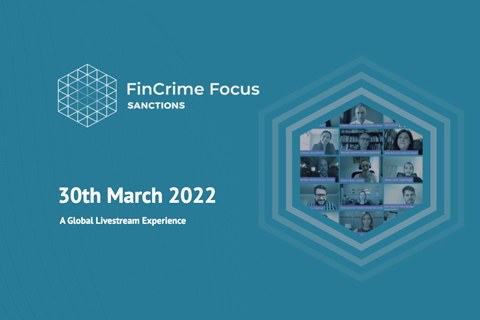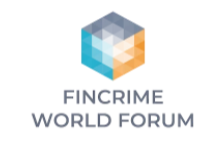Yesterday at FinCrime Focus: Sanctions, experts gave their views into the laws and multinational initiatives defining the global sanctions landscape at a crucial time in the fight against the financial criminals.

Most countries have used sanctions or had sanctions placed against either them or their citizens. Nowhere has this been more in evidence through 2022 than in Western allies’ strategy to pressurise Russia into ending its war against Ukraine.
The issue was central to debate at FinCrime Focus: Sanctions, where over twenty subject-matter specialists gave insight into the implementation of sanctions and the crucial role they play in upholding peaceful governance.
In the second session at FinCrime Focus: Sanctions, a panel of experts looked at the new Russian and Belarusian sanctions regimes, with an emphasis on the development of countermeasures and the use of crypto in light of the war in Ukraine.
Commenting on the differences between US and UK law, Joshua Ray, Partner, Rahman Ravelli, said:
“In the US sanctions extend to specific designated companies and whatever they own. In the UK, they look at ownership and control; if you don’t own you can still face an asset freeze if you have any kind of control. It is an interesting issue we’ve been dealing with and that many individuals should be aware of.”
Malcom Wright, InnoFi advisory, said:
“It would be wrong to say crypto is not regulated; it is in the UK, US, Singapore, Japan and many other countries. This includes AML framework; crypto framework is similar to any framework a bank uses.”
“The thing you get from crypto is blockchain analytics that tracks where it is coming from and going to. It is traceable”.
“If you looked at asset recovery in crypto and cash terms…recovering large amounts proves that crypto has this level of transparency and traceability,” Malcom Wright continued.
Elaborating on how we can more safely screen customers against sanctioned entities, especially high risk customers, Joshua Ray said:
“Knowing who your customers are, screening, even if you get all the commercial tools out there nothing is sure, so make sure that your screening process is well documented. Prepare for the day when a regulator comes knocking on your door where you should have a well-documented paper trail.”
“An asset freeze is not the same thing as an asset confiscation, freezing assets is easy since the asset can’t be transferred, serviced, or moved but it doesn’t mean that it becomes a property of the government,” Joshua Ray continued.
Next under the microscope were FATF’s revised recommendations and the proliferation of financing-targeted sanctions, in a talk that explored bridging the gap between a rules-based standard and a risk-based approach.
Andrew Dalip, Attorney/Consultant in AML/CTF/CPF, said:
“Very few countries have conducted National PF assessments. There are issues in incapacity of training in national risk assessments.
“Many lower capacity countries are actually currently still revising their anti-money laundering (AML) regulations. The general approach to PF risk assessment is not so similar to AML and anti-terrorist assessments. Countries need to assess their threats.
“A key factor of national PF risk assessment is how exposed the country is to Weapons of Mass Destruction supply,” Andrew Dalip continued.
In the afternoon, Amanda Wick, Senior Investigative Counsel for the US House of Representatives explored US finance regulatory developments, with focus on cryptocurrency, CBDC (central bank digital currency) and sanctions.
Amanda Wick said:
“If we fail at the things we need to do the ramifications would be huge. We need more creativity in cryptocurrency, CBDC, and sanctions, although governments are very slow at that.
“There was no reference to funding and one of our biggest problems in the US is underfunded and understaffed listed agencies. The solution to the efficacy of the US’s executive order are bodies and resources.”
“Crypto illiteracy is the biggest risk; if the people writing these reports don’t know these technologies it is a big problem. No-one has been calling out the lack of enforcement in crypto. Reports are put out on what the riskiest transactions are, which is something people don’t realise and that is their transparency,” Amanda Wick continued.
In the final talk at FinCrime Focus: Sanctions, experts turned their attention to sanctions for cyber, corruption, election fraud, climate control and human rights, before outlining what leaders can expect to see through 2022.
Francis Bond, solicitor at Macfarlanes LLP, said:
“Sanctions will take the place of criminal law. You have these confiscation powers and you can use them against these individuals, why would you go for sanctions?”
“Using sanctions makes it harder to catch someone; you just freeze their assets.”
“On the other hand, the use of sanctions has been seen as a success story with how the US dealt with narcotics,” Francis Bond continued.
Andrew Dalip, Attorney/Consultant in AML/CTF/CPF, said:
“Sanctions [represents] more of an intangible issue. I can still see some relevance of sanctions when you have a non-cooperative government as a target.”
Catch-Up and watch all the sessions on-demand
FinCrime World Forum
Part of the Digital Trust Europe Series
FinCrime World Forum is a two-day in-person event taking place as part of the Digital Trust Europe series. The event will feature presentations and panels from thought-leaders and anti-financial crime professionals that are leading the way on how we can better, more efficiently and more effectively fight financial crime.
Find out more about FinCrime World Forum






















No comments yet